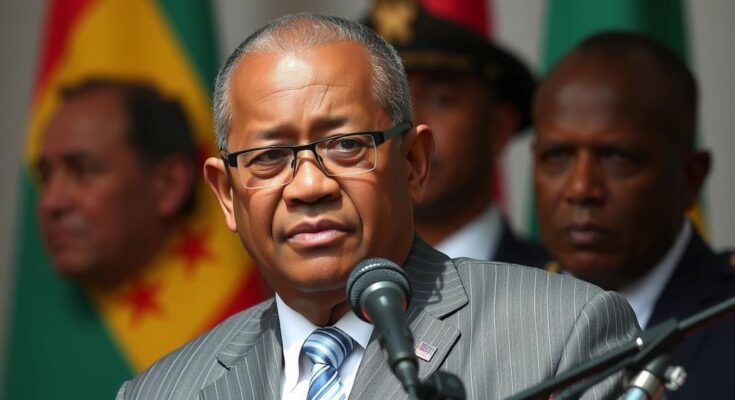Daniel Chapo’s inauguration as Mozambique’s new president occurs amid violent unrest following disputed elections, with opposition leader Venancio Mondlane threatening continued demonstrations against the perceived electoral fraud. Chapo committed to unity and welfare but faces a challenging political climate, with increasing calls for dialogue and potential compromise needed to stabilize the nation.
On Wednesday, Daniel Chapo was inaugurated as Mozambique’s new president amid significant security presence and escalating tensions following violently contested elections. His ascendancy extends the Frelimo party’s long-standing dominance, despite accusations from opposition leader Venancio Mondlane regarding electoral malpractice that allegedly resulted in over 300 fatalities during subsequent unrest. In his inaugural address, President Chapo pledged commitment to national unity, human rights, and the welfare of the Mozambican populace. Mondlane, however, threatened a campaign of daily protests to challenge the legitimacy of Chapo’s administration, citing a need to address grievances regarding the electoral process.
Chapo’s inauguration saw limited participation from international leaders, with observers remarking that the absence of numerous foreign dignitaries may indicate a lack of consensus on the election results. Although the situation in Maputo remained calmer on the day of parliamentary lawmaker swearing-in, security forces maintained a visible presence to deter potential violence. Reports subsequent to the elections highlight that confrontations between protesters and security forces have resulted in multiple casualties. Analysts suggest that Chapo may need to consider compromises, potentially appointing opposition figures to key governmental positions to foster stability and dialogue going forward.
Although he has publicly expressed willingness to include Mondlane in future discussions, the ongoing protests signal a challenging path ahead for the new administration. Mondlane’s return to the nation, following a period in hiding, solidifies his commitment to contesting the results of the elections. Official tallies show Chapo with a 65% majority, contrasting sharply with Mondlane’s reported 24%. In a country marked by uncertainty, the effectiveness of Chapo’s governance will ultimately rely upon his ability to navigate this complex political landscape effectively, ensuring both peace and progress for Mozambique.
The recent elections in Mozambique have been a focal point of unrest and controversy, underscoring the deeply rooted political tensions in the region. The Frelimo party, which has ruled since the nation’s independence in 1975, faced allegations of electoral fraud that sparked violent protests. The new president, Daniel Chapo, is stepping into office amid significant challenges, including dissent from opposition groups that have accused the government of undermining democratic principles. With the stability of the nation at stake, the responses from both Chapo’s administration and the opposition will prove pivotal in shaping Mozambique’s political future.
In summary, Mozambique’s inauguration of President Daniel Chapo marks a critical juncture in the nation’s political landscape, following a turbulent electoral process. The heightened tensions stemming from allegations of fraud and the resulting civil unrest pose significant challenges to his administration. As both sides navigate their positions, the potential for political dialogue and compromise could influence the future of governance in Mozambique, emphasizing the necessity for unity and peace in a nation historically marked by conflict.
Original Source: www.france24.com




